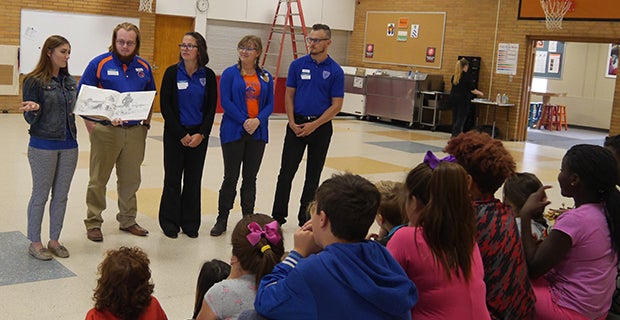
In October, Lori Gray, an assistant professor and director of music education at Boise State University, and Amy Wickstrom, a graduate assistant in music education, involved their MUS 373 students in an innovative hands-on learning experiment: they planned, designed and taught a full-day music camp for students at William Howard Taft Elementary School, a Title 1 and community programs school in Boise.
Gray and Wickstrom wanted their students to experience different school communities and to reflect on how social issues may impact education for K-12 students and were able to do so with help from the Service-Learning Program.
“Through the service learning project, we had to move beyond hypotheticals,” said Boise State student Esther Roedel. “We didn’t just discuss things that might be important to include in a program, we created a program. We didn’t just theorize about classroom control, we had to practice it.”

Taft students learned about music through singing, moving and playing instruments. They interacted for a full day with Boise State college students, giving them positive exposure to higher education. Taft parents also benefited, as the mini-music camp was offered on a parent-teacher conference day, when classes were canceled. The music camp gave parents an alternative to hiring childcare.
In addition, the camp demonstrated to campus and community stakeholders that Boise State faculty and students are committed to strengthening the community in which the university resides, while also enhancing student learning and developing workforce skills.
“Students at Taft were able to experience music making from rehearsal to performance, seeing their progress within the course of a single day,” said Taft music teacher Matt Thayer.
Enhancing career readiness through community-engaged learning is a priority for all Boise State students. Students across campus are gaining experiences “Beyond the Major” through programs like service-learning, Work-U, study abroad, student research and other high impact practices. Service-learning uniquely engages students in the community as part of a class, much like a class project. It is often a helpful precursor to more intense practica or internships.
“A traditional general music methods course does not typically allow for undergraduate students to teach elementary students for an extended period of time,” Wickstrom explained. “Most elementary methods courses allow for observation and brief teaching interactions. Giving this opportunity to our students (teaching elementary children for a full day) sets them up to be more successful for teaching in whatever area of music they will teach in the future.”
“The mini-music camp allowed our students to experience the full process of organizing a major event for the school community, from planning the lessons, to designing and sending written communication to families, to teaching the children throughout the day, to interacting with the families, faculty, and staff within a school community, to presenting a final performance at the end of the day showcasing the students’ learning,” Gray added. “Our students felt what it was like to actually be a music teacher in a school, from juggling the multiple roles all teachers hold (duties like recess and lunch) and handling classroom management and the logistics of a school music program.”
Boise State is expanding service-learning opportunities across campus and into new disciplines. Each year, more than 2,800 students engage with service-learning in more than 160 classes from 40 departments and programs.
The campus and the public are invited to talk directly to service-learning students, including these music students, at the Service-Learning Exhibition from 4-6 p.m. on Thursday, Dec. 6, in the Student Union Lookout room.